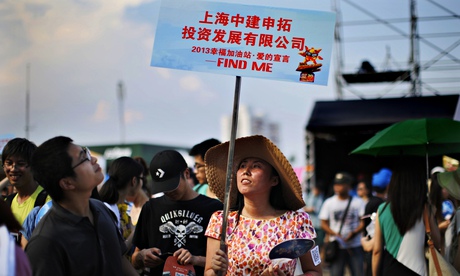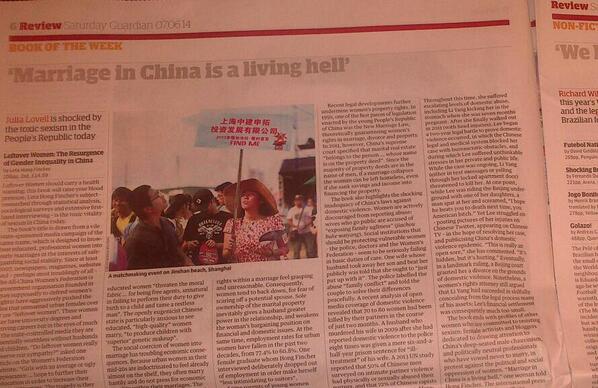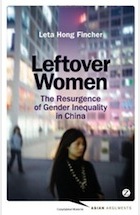Leta Hong Fincher has written a shocking account of the way women are treated in the People’s Republic
The Guardian, Thursday 5 June 2014 02.30 EDT

A matchmaking event on Jinshan beach, Shanghai. Photograph: Carlos Barria/Reuters
Leftover Women should carry a health warning: this book will severely raise your blood pressure. Leta Hong Fincher’s subject – researched through statistical analysis, sociological surveys and extensive first-hand interviewing – is the toxic vitality of sexism in China today.

Leftover Women: The Resurgence of Gender Inequality in China (Asian Arguments)
by Leta Hong Fincher

The book’s title is drawn from a vile state-sponsored media campaign of the same name, which is designed to browbeat educated, professional women into early marriages in the interests of safeguarding social stability. Since at least 2007, newspapers, magazines, websites and – perhaps most troublingly of all – the All-China Women’s Federation (a government organisation founded in 1949 supposedly to defend women’s rights) have aggressively pushed the idea that unmarried urban females over 27 are “leftover women”. These women may have university degrees and thriving careers but in the eyes of much of the state-controlled media they are essentially worthless without husbands and children. “Do leftover women really deserve our sympathy?” asked one article on the Women’s Federation website. “Girls with an average or ugly appearance … hope to further their education in order to increase their competitiveness. The tragedy is they don’t realise that, as women age, they are worth less and less, so by the time they get their MA or PhD, they are already old, like yellowed pearls.”
Although the Chinese media makes much noise about the country’s epidemic of “leftover” single women, there are in fact far more “leftover” Chinese men, due to a traditional preference for sons and sex-selective abortions. By 2012, there were 117.7 boys to every 100 girls. “The continual accumulation of unmarried men of legal marrying age,” admits the Communist party’s mouthpiece, the People’s Daily, “greatly increases the risk of social instability and insecurity.” In this context, Hong Fincher writes, single, educated women “threaten the moral fabric … for being free agents, unnatural in failing to perform their duty to give birth to a child and tame a restless man”. The openly eugenicist Chinese state is particularly anxious to see educated, “high-quality” women marry, “to produce children with ‘superior’ genetic makeup”.
The social coercion of women into marriage has troubling economic consequences. Because urban women in their mid-20s are indoctrinated to feel already almost on the shelf, they often marry hastily and do not press for economic equality within their marriages. The urban Chinese today are preoccupied with buying a home. In cities such as Beijing and Shanghai, prices have skyrocketed in recent years, resulting in an extraordinary appreciation in real-estate wealth. Working women often contribute their life savings to securing a marital apartment, and siphon their salaries into mortgage repayments. Yet although more than 70% of women help finance the purchase of a marital home, only 30% of such deeds include the wife’s name, and their contributions to mortgages are frequently not officially acknowledged. Hong Fincher’s research suggests that husbands and inlaws often make women who request property rights within a marriage feel grasping and unreasonable. Consequently, women tend to back down, for fear of scaring off a potential spouse. Sole ownership of the marital property inevitably gives a husband greater power in the relationship, and weakens the woman’s bargaining position on financial and domestic issues. At the same time as women have been left out of China’s property boom, employment rates for urban women have fallen in the past two decades, from 77.4% to 60.8%. One female graduate whom Hong Fincher interviewed deliberately dropped out of employment in order make herself “less intimidating to suitors”.
Some parents of young women also fail to support their daughters emotionally and materially, compared to sons. One father told her daughter that she would not be able to have children after the age of 30. Parents routinely help sons buy their own apartments, but many choose to financially assist a male nephew rather than their own daughter. Chinese parents commonly feel they have no responsibility to buy a house for a daughter; that is the duty of a spouse. As a result, urban Chinese women have lost out badly in the massive growth in private home ownership of the past decade and a half.
Recent legal developments further undermine women’s property rights. In 1950, one of the first pieces of legislation enacted by the young People’s Republic of China was the New Marriage Law, theoretically guaranteeing women’s rights in marriage, divorce and property. In 2011, however, China’s supreme court specified that marital real estate “belongs to the person … whose name is on the property deed”. Since the majority of property deeds are in the name of men, if a marriage collapses the woman can be left homeless, even if she sank savings and income into financing the property.
The book also highlights the shocking inadequacy of China’s laws against domestic violence. Women are actively discouraged from reporting abuse: wives who go public are accused of “exposing family ugliness” (jiachou buke waiyang). Social institutions that should be protecting vulnerable women – the police, doctors and the Women’s Federation – seem to be seriously failing in basic duties of care. One wife whose husband took away her son and beat her publicly was told that she ought to “just put up with it”. The police labelled the abuse “family conflict” and told the couple to solve their differences peacefully. A recent analysis of open media coverage of domestic violence revealed that 70 to 80 women had been killed by their partners in the course of just two months. A husband who murdered his wife in 2009 after she had reported domestic violence to the police eight times was given a mere six-and-a-half-year prison sentence for “ill-treatment” of his wife. A 2013 UN study reported that 50% of Chinese men surveyed on intimate partner violence had physically or sexually abused their partner, and that 72% of Chinese rapists suffered no legal consequences. Moreover, Hong Fincher writes, “marital rape is not considered a crime in China”. Activists have been campaigning for an effective law on domestic violence for a decade; no legislation has resulted.
Although extremely depressing, the book is also scattered with inspiring life-stories of courageous women who have faced down appalling discrimination. One example is Kim Lee, a US woman who in 2005 married the billionaire entrepreneur Li Yang. For years, she helped develop his business and brought up their three daughters. Throughout this time, she suffered escalating levels of domestic abuse, including Li Yang kicking her in the stomach when she was seven months pregnant. After she finally walked out in 2011 (with head injuries), Lee began a two-year legal battle to prove domestic violence occurred, in which the Chinese legal and medical system blocked her case with successive bureaucratic obstacles, and during which Lee suffered unthinkable stresses in her private and public life. While the case was ongoing, Li Yang (either in text messages or yelling through her locked apartment door) threatened to kill her. At one point, while Lee was riding the Beijing underground with one of her daughters, a man spat at her and screamed, “I hope he beats you to death next time, you American bitch.” Yet Lee struggled on – posting pictures of her injuries on Chinese Twitter, appearing on Chinese TV – in the hope of resolving her case, and publicising China’s domestic violence epidemic. “This is really an open sore,” she has commented. “It’s hidden, but it’s hurting.” Eventually, in a landmark ruling, a Beijing court granted her a divorce on the grounds of domestic violence. Nonetheless, a women’s rights attorney still argued that Li Yang had succeeded in skilfully concealing from the legal process many of his assets; Lee’s financial settlement was consequently much too small.
The book ends with profiles of other women who are committed to resisting sexism: female activists and bloggers dedicated to drawing attention to China’s deep-seated male chauvinism, and politically neutral professionals who have vowed never to marry, in protest against the political and social oppression of women. “Marriage in China is a living hell,” one woman told Hong Fincher. The international press – with headlines such as “China dominates list of female billionaires” and “Women in China: the sky’s the limit” – trumpets the egalitarian opportunities that Chinese women enjoy. Leftover Women is a highly sobering corrective to this rosy picture, but also gives faint grounds for hope that the fight for gender equality in China is not yet dead.
• Julia Lovell’s books include The Opium War: Drugs, Dreams and the Making of China. To order Leftover Women with free UK p&p call Guardian book service on 0330 333 6846 or go to guardianbookshop.co.uk
From:http://www.theguardian.com/books/2014/jun/05/leftover-women-gender-inequality-china
